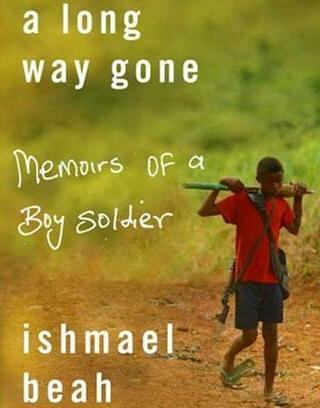I'm working on this book my dad bought. Its called A Long Way Gone by Ishmael Beah. It is the true story of life in Sierra Leone during the civil war.
In Sierra Leone, there are a group of rebels who are 'fighting for the people' or so they claim. They do this by raiding villages, recruiting men and boys, abusing women and girls (to put it mildly) and killing as many people as they can.
Ishmaels journey begins when he leaves his village to participate in a talent show. The next day people come to the village he is staying in, covered in blood and bringing news of the rebels attack. Ishmael and his friends move on, trying to find their families. This is particularly difficult because they are all between the ages of 12 and 16, the age at which most rebels are.
I have cried alot while reading this book. The cruelty people show towards one another is astonishing, but the kindness despite the risks is even more so.
Tonight I sobbed because Ishmael and his friends, minus one who didn't make the journey, finally come to the village where their families are said to be staying. They stop to help a man from their village carry bananas. As they come to the crest of a hill that overlooks the villages, they hear screams and gunshots. The rebels attacked the village, killed everyone in it, and set everything on fire.
As I was reading, I could just see him running through the smoke, hoping to find his family even though he knew they were dead. I'm starting to cry just thinking about it. He is filled with regrets; if only we hadnt stopped to rest, if only we hadnt helped carry the bananas, if only, if only, if only . . .
But then they would have died with their families. He said he would have rather died with them, than had come so close to finding them and losing them once again, this time for good.
When Ishmael and his friends leave the destroyed village, chased by rebels for hours, they come to Yele, where government soldiers are protecting. He said it was a particularly large village, 'with more than ten houses'.
They stayed for days with other orphans, helping by doing chores around the kitchen. Eventually, the war reached them there too.
Soldiers went out each day to fight, and each day fewer came back. The general in charge had to recruit boys and men aswell, but he didnt force them. Everyone knew that if they left the village they would die.
He said that as they were being given guns and ammunition, the youngest boys there were aged 7 and 11. The rest were anywhere between 13 and 17.
This was where I started to sob.
I could just imagine my 7 year old cousin, standing next to my 11 year old brother, both holding guns too big for a childs hands. Then I thought about my other brother and my dad, my boyfriend and my friends, and all the young men I go to school with, and I couldnt beleive that people just like us were fighting for their lives.
War is a waste. It proves nothing, other than the fact that we are capable of murder and cruelty and hate and all other horrible things.
Think of all the things those people could have done. The children and the men and women. The horrible things that happened to them. Mothers and fathers watching their children die before they themselves are killed, children watching their parents and siblings killed for reasons they don't understand, that no one really understands.
It makes me want to lay down and cry for these people, I want to hold them and tell them they are okay, I want them to be safe and unafraid, I want them to be alive and well.
But they aren't, and they never will be again.
If you ever take even one peice of advice from me or any one else, I suggest you read this book and remind yourself of the world as it is seen through the eyes of the suffering people in it. Everyone should.
